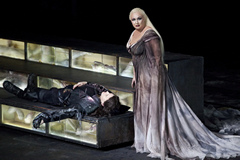| Opera Reviews | 27 April 2024 |
Götterdämmerung concludes the La Scala Ringby Silvia Luraghi |
|
| Wagner: Götterdämmerung Teatro alla Scala, Milan 7 June 2013 |
|
|
The Guy Cassiers production of the whole Ring will then play again in June when the Milanese audience will be able to enjoy the first week-long La Scala Ring since 1938. With Götterdämmerung it was possible to appreciate Cassiers' vision of Wagner's masterpiece. The twilight of the gods ends with the same picture of Jef Lambeaux's bas relieve Les passions humaines which had been shown at the opening of Das Rheingold. The Belgian director tells us that nothing has really changed. As he explained in an interview, 'the fictitious world becomes the real world, and Lambeaux's work points to the overwhelming and relentless strength of the real protagonist of the long Wagnerian poem.' In the prologue, the curtain opens on the dark stage, where the Norns unravel long, shining red threads that descend on the stage from the top. After hearing their story, we see Siegfried sleeping on the same rock where he had found Brünnhilde. It is now her who wakes him up with a kiss, without foreseeing the imminent doom. Then the first act starts, with Siegfried visiting the Gibichungs. Brünnhilde is visited by her sister Waltraute, who begs her to return the ring, but she refuses. She remains on the rock, with red blades of fire hanging over her. Siegfried returns, but he has meanwhile drunk the potion of forgetfulness, and met Gutrune. Disguised in a giant black cover, and hidden by four dancers, he now seduces Brünnhilde for Gunther. The second act opens on a white lit scene with a reclining panel, the banks of the Rhine where Hagen promises Alberich to return the ring, while the golden waves of the river appear projected on the backstage. The Gibichung vassals welcome Gunther and his bride by the river; the same panel offers the background for Gunther's palace. In the third act, the Rhinemaidens come dancing onto the stage, as they mourn the loss of the Rheingold. The hunting party starts, with the protagonists on stage doubled by projections on the background. The casting was planned consistently with Siegfried, which was shown earlier this season, and featured the same principals, Iréne Theorin as Brünnhilde and Lance Ryan as Siegfried. While the soprano met expectations, and in fact her voice sounded in better shape, and better focussed at the top than in the earlier production, the tenor sounded tired. His voice sounded too light for a Heldentenor, and seemed 'bleached' throughout his register. The other female members of the cast where also very good, especially Waltraud Meier as Waltraute and the second Norn, who sang in her usual tasteful and flawless way. Anna Samuil as Gutrune and the third Norn also displayed a nicely colored voice, and looked completely at ease in her role. On the male side Mikhail Petrenko as Hagen was perhaps not ideally cast. Much better were Gerd Grochowski as Gunther and especially Johannes Martin Kränzle in the role of Alberich. The orchestra played with commitment, raising good expectations for the upcoming Ring cycle. |
|
| Text ©
Silvia Luraghi Photo © Brescia/Amisano © Teatro alla Scala |

 The
Ring's last day, Götterdämmerung, closed the three year Ring
project at La Scala last week. After cancelling the first three performances
due to health problems (which, however, did not prevent him from conducting
Brahms's Ein Deutsches Requiem in Salzburg), Daniel Barenboim
took his place in the pit, and conducted the last three performances.
The
Ring's last day, Götterdämmerung, closed the three year Ring
project at La Scala last week. After cancelling the first three performances
due to health problems (which, however, did not prevent him from conducting
Brahms's Ein Deutsches Requiem in Salzburg), Daniel Barenboim
took his place in the pit, and conducted the last three performances.






